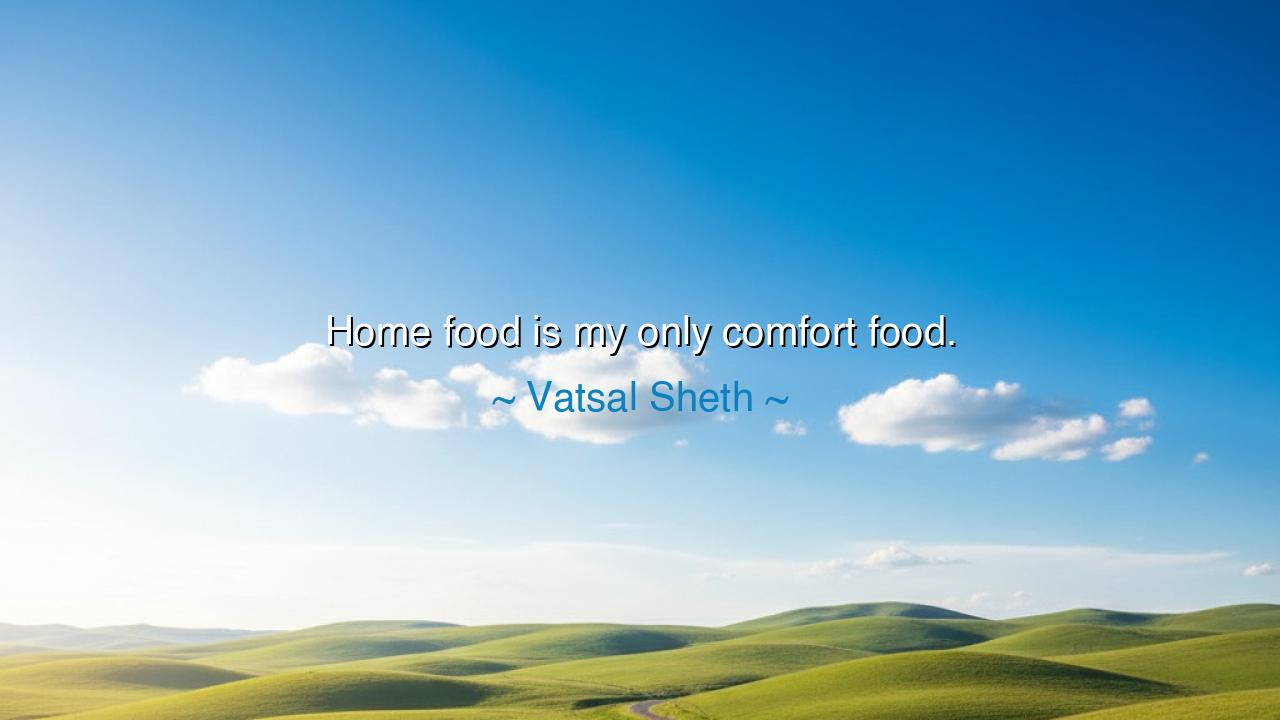
Home food is my only comfort food.






Hear the heartfelt words of Vatsal Sheth, who said: “Home food is my only comfort food.” Though simple in form, these words hold the fragrance of memory and the warmth of belonging. They speak of that sacred bond between nourishment and nostalgia—between the body that eats and the heart that remembers. For in every grain of rice, every morsel of bread prepared by loving hands, there is something far greater than sustenance. There is home, and home, as all wise souls know, is the first temple of the human spirit.
The origin of this saying lies in the life of one who, like so many travelers of this world, has tasted fame and fortune yet found true peace not in luxury, but in simplicity. Vatsal Sheth, an actor known for his work across screens and stages, has walked the glittering paths of success, yet he returns in heart to the humble comfort of home-cooked meals. His words arise from the recognition that amidst the noise of the world—the banquet tables, the feasts of indulgence—it is the food of home that carries the flavor of authenticity, the taste of love unadorned by pretense. What he celebrates is not merely cuisine, but the soul of nourishment: the love that cooks it, the memories it awakens, and the belonging it restores.
The ancients, too, understood this truth. For when Odysseus, the wanderer of Ithaca, journeyed across seas and storms, he dined in the halls of kings and ate the finest of foods. Yet none of it filled his heart as did the simple bread and wine of his own hearth. When at last he returned home, weary and scarred, it was not jewels or gold that brought him peace, but the humble meals of his homeland, served by those who knew him not as a hero, but as a son, a husband, a father. So it is with us all: the food of home nourishes not only the body, but the soul that longs to be remembered.
To call home food one’s only comfort food is to honor the place where love and labor unite. Every dish cooked at home carries unseen meaning—the careful seasoning, the patient stirring, the shared laughter and stories that fill the kitchen air. These meals are more than sustenance; they are acts of devotion. They remind us that comfort is not found in extravagance but in familiarity—in the things that tell us, “You belong.” For the food of home speaks in a language older than words: the language of care, of roots, of remembrance.
Yet the deeper wisdom of Sheth’s words lies beyond appetite. He speaks of a universal hunger—the hunger for connection in a world that too often prizes speed over sincerity. In the rush of modern life, we eat in haste, we consume without reflection, and we lose the sacredness of the table. But to return to home food is to return to the rhythm of love—to pause, to taste, to remember where we came from. It is an act of gratitude in a time of forgetting.
Consider, too, the story of Mahatma Gandhi, who, despite his global influence, always cherished the simple vegetarian meals of his upbringing. Even when surrounded by the powerful, he found solace in the humble foods of his homeland. He understood that such food did not merely sustain his strength—it grounded him in humility and truth. Like Sheth, Gandhi’s love for simplicity reminds us that greatness is born not from indulgence, but from remembrance—of our roots, our families, and the soil that raised us.
Thus, the lesson in these words is one of return—a return to simplicity, to gratitude, to authenticity. In the quest for comfort, seek not what is fashionable, but what is familiar. Remember the meals that once gathered your family together, the scents that filled your childhood home, the flavors that spoke of care. To eat such food with mindfulness is to commune not only with memory but with meaning.
So, children of tomorrow, let this truth guide you: the truest comfort food is not bought but shared; not found in distant places but prepared in the heart’s own kitchen. Cherish the hands that cook for you, and when it is your turn, cook for others with the same love. For in doing so, you will not only feed their bodies but also awaken the sacred comfort that dwells in the spirit. In the end, as Vatsal Sheth reminds us, all roads of hunger and longing lead home—and the meal that waits there is not merely food, but love made visible.






AAdministratorAdministrator
Welcome, honored guests. Please leave a comment, we will respond soon